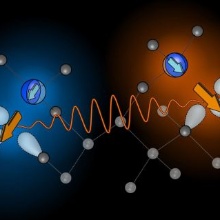Quantum Information Processing
Quantum computing is an attractive and multidisciplinary field, which became a focus for experimental and theoretical research during the last decade. Among other systems, such as ions in traps and superconducting circuits, solid state based qubits are considered to be promising candidates for use in in quantum hardware. At PI3, we use point defects in diamond for implementing quantum information protocols. Qubits are defined as spin states of single electron or nuclear spins, and the long coherence time of either of these both at room and low temperatures allows us to perform quantum algorithms, quantum error-correction and achieve multi-partite entanglement. Using resonant excitation at low temperature we use these systems for realizing quantum repeater networks, and photon memories.





